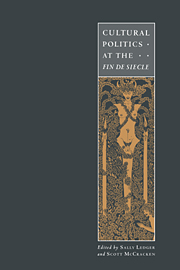Book contents
- Frontmatter
- Contents
- List of illustrations
- Notes on contributors
- Acknowledgements
- Introduction
- 1 The flight to the real
- 2 The New Woman and the crisis of Victorianism
- 3 Empire, ‘race’ and feminism at the fin de siècle: the work of George Egerton and Olive Schreiner
- 4 W. B. Yeats and Irish cultural politics in the 1890s
- 5 The double lives of man: narration and identification in late nineteenth-century representations of ec-centric masculinities
- 6 Henry James and the spectacle of loss: psychoanalytic metaphysics
- 7 ‘A very curious construction’: masculinity and the poetry of A. E. Housman and Oscar Wilde
- 8 The Pilgrims of Hope: William Morris and the dialectic of romanticism
- 9 Urban utopias: socialism, religion and the city, 1880 to 1900
- 10 Vampires and the empire: fears and fictions of the 1890s
- 11 Utopia, Limited: nationalism, empire and parody in the comic operas of Gilbert and Sullivan
- 12 Technologies of monstrosity: Bram Stoker's Dracula
- 13 Postmodernism, a Chance to reread?
- 14 Is market society the fin of history?
- Select bibliography
- Index
14 - Is market society the fin of history?
Published online by Cambridge University Press: 29 September 2009
- Frontmatter
- Contents
- List of illustrations
- Notes on contributors
- Acknowledgements
- Introduction
- 1 The flight to the real
- 2 The New Woman and the crisis of Victorianism
- 3 Empire, ‘race’ and feminism at the fin de siècle: the work of George Egerton and Olive Schreiner
- 4 W. B. Yeats and Irish cultural politics in the 1890s
- 5 The double lives of man: narration and identification in late nineteenth-century representations of ec-centric masculinities
- 6 Henry James and the spectacle of loss: psychoanalytic metaphysics
- 7 ‘A very curious construction’: masculinity and the poetry of A. E. Housman and Oscar Wilde
- 8 The Pilgrims of Hope: William Morris and the dialectic of romanticism
- 9 Urban utopias: socialism, religion and the city, 1880 to 1900
- 10 Vampires and the empire: fears and fictions of the 1890s
- 11 Utopia, Limited: nationalism, empire and parody in the comic operas of Gilbert and Sullivan
- 12 Technologies of monstrosity: Bram Stoker's Dracula
- 13 Postmodernism, a Chance to reread?
- 14 Is market society the fin of history?
- Select bibliography
- Index
Summary
In 1989, Irving Kristol's The National Interest devoted a volume to Francis Fukuyama's article ‘The End of History?’ and commentary on it. Fukuyama, former analyst at the Rand Corporation and then deputy director of the State Department's policy planning staff, offered the ‘Hegelian’ argument that with the ‘triumph of Western economic and political liberalism’ we are witnessing ‘the end of history as such … the end point of mankind's ideological evolution and the universalization of Western liberal democracy as the final form of human government’. Citing the ‘spectacular abundance of advanced liberal economies and the infinitely diverse consumer culture made possible by them’ (p. 8), Fukuyama announced that political liberalism is following economic liberalism ‘with seeming inevitability’ (p. 10) and that class and ‘race’ antagonism are merely ‘historical legacies of premodern conditions’, already on the way out. Only in his last paragraph, when describing the way that passions under market economies give way to interests, which are subsumed under bureaucratic rationality, does Fukuyama sentimentally express a nostalgia for history as such:
The end of history will be a very sad time. The struggle for recognition, the willingness to risk one's life for a purely abstract goal, the worldwide ideological struggle that called forth daring, courage, imagination, and idealism, will be replaced by economic calculation, the endless solving of technical problems, environmental concerns, and the satisfaction of sophisticated consumer demands, (p. 18)
- Type
- Chapter
- Information
- Cultural Politics at the Fin de Siècle , pp. 290 - 310Publisher: Cambridge University PressPrint publication year: 1995
- 1
- Cited by



